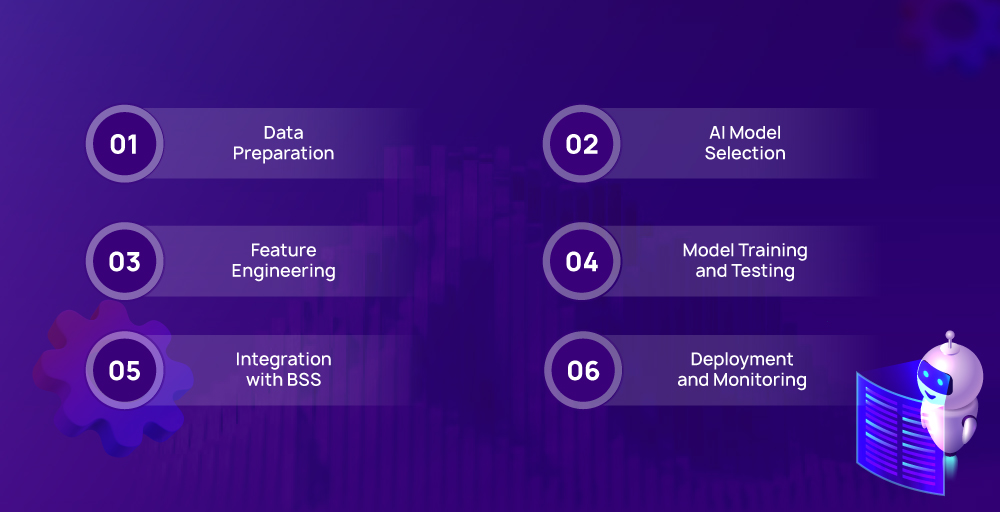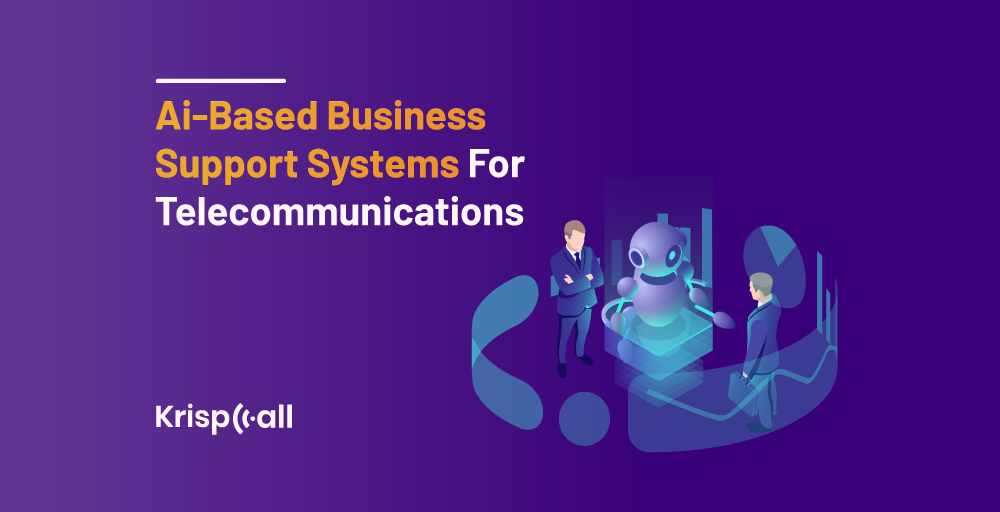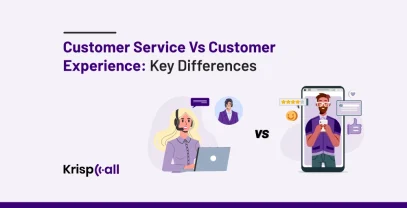Are you tired of handling customer service calls and having a hard time meeting their needs and demands? 😧
The telecommunications industry is developing rapidly📈 and competition is fierce. If you want to stay ahead of your competition, an AI-based business support system (BSS) is your best option. With artificial intelligence BSS, you can automate tasks, predict customer needs, and optimize your network.
In this blog, we’ll take a closer look at how AI-based business support systems can transform your telecom business and the importance of BSS systems in a business to optimize operations and boost organizational growth to meet customers’ evolving needs. We will also discover the steps to implement and what challenges may be faced while implementing it in telecom industries in the telecom business.
🔑KEY HIGHLIGHTS
- AI-Business support systems are a set of tools that help to manage customers and run telecom industries smoothly.
- AI-driven Business support systems are important for streamlined sales processes, making data-driven strategies, personalized customer experiences, and gaining competitive advantage.
- Steps for integrating AI into the Business Support System are data preparation, AI model selection, feature engineering, model training and testing, integration with the business support system, and deployment and monitoring.
- Challenges such as a lack of experts, data quality and integration, security issues & privacy issues, and integrating with existing systems are associated with implementing an AI-based business support system.
- The AI-driven BSS will make operations faster, easier, and more efficient. It will also automate tasks in real time and provide essential data to make quick decisions.
What is a Business Support System?
A business support system(BSS) is a collection of applications or tools that support telecom industries to manage their customers and operational systems in an effective way. It performs various operations such as managing customer service strategies, billing customers, tracking customer data, processing orders, and customer relationship management.

Business support systems always provide faster & better customer service that helps to improve customer satisfaction rates with better operational work efficiency in telecom companies.
By using the business support system, you can monitor and track metrics such as inventory levels, website traffic, conversion sales, and more, so the decision-making process can be simplified.
In simple words, a business support system is a set of tools or processes that help companies run smoothly.
Why Business Support System Is Important For Telecommunication Sales?
A business support system (BSS) plays an important role in the success of telecommunication sales. It provides a base for streamlining business processes and better customer experience. It also helps to create data-driven sales strategies and gain a competitive advantage to enhance user experience.
A business support system is important for telecommunication for the following various reasons:
Streamlined Sales Process
An AI business support system facilitates a streamlined sales process, allowing for automation and providing virtual assistance to optimize sales processes and bring efficiency in performance.
Automation in the various steps of sales planning, such as leads management, order management, and customer interaction, leads to faster transactions. Additionally, telecommunication business support systems improve workflow efficiency, eliminating unnecessary processes and optimizing available resources efficiently.
Personalized Customer Experience
An AI-based business support system in the telecommunications sector can leverage valuable data to provide customers with customer-centric self-service options or personalized customer experiences.
Using AI chatbots, telecom companies can provide a self-service option to their customers, which reduces the waiting times and satisfies customers. Data collected from CRM systems and other BSS components, sales teams provide customers with targeted recommendations and troubleshooting solutions based on preferences and behaviors.
Data-Driven Sales Strategies
AI-driven business support systems in telecom companies provide valuable data and information to provide data-driven customer service results. It collects data from various source CRM systems, customer interactions, market trends, and sales evaluation metrics and provides valuable data insights to optimize sales strategies.
For example, AI-based predictive analytics helps to forecast customer preferences and demand for a product and services, which allows telecom companies to develop strategies to meet customer’s demands and maximize sales volume. It also helps optimize marketing campaigns and promotions and improves the decision-making process.
Competitive Advantage
By leveraging support system functionality in business, telecommunications companies can gain a competitive advantage in the market. With optimized processes and smooth sales plans, telecom companies can grow in the market in a short period of time.
BSS helps reduce customer churn by providing personalized customer service and long-term retention. It optimizes resource allocation and minimizes errors, thereby reducing operational costs.
How Can Telecom Companies Integrate AI Into Their Business Support System?

Integrating AI into Business Support Systems (BSS) for telecom companies involves several steps for successful implementation.
These are the steps to follow while integrating AI into BSS:
1. Data Preparation
This is the first step in integrating artificial intelligence into telecom companies’ business support systems. This involves collecting and organizing relevant data from various components of the business support system, including CRM, billing transactions, customer interaction tools, and order management systems.
Data can be collected in different formats, which should be standardized and cleaned to ensure consistency and compatibility. It also involves the identification of issues such as inconsistencies, duplication, and missing values to ensure data quality.
2. AI Model Selection
Different telecom companies have different objectives, such as sales forecasting, lead prioritization, and churn prediction. Depending on their objectives, telecom companies should select the appropriate AI model.
While selecting AI models, telecom companies should consider factors such as accuracy, interpretability, scalability, etc., to get the perfect AI model for a business support system that will bring smooth efficiency to workflow.
3. Feature Engineering
Feature engineering is the process of creating meaningful features from raw data. AI models can use such meaningful features to make predictions, prioritize, or generate valuable insights.
In telecom companies, business support systems include features such as customer lifetime value (CLV), customer segmentation, billing history, geographical location, product affinity, churn risk indicators, and many more.
4. Model Training and Testing
After data preparation and feature engineering, model training and testing should be done to train AI models using historical data. First, train the AI model using historical by giving labeled data to introduce patterns and relationships.
After training AI models, test and evaluate them to measure their performance, ability, and effectiveness in telecom companies for business support systems.
5. Integration with BSS
After training and testing, generative AI models are used in telecom companies’ business support systems(BSS). In this step, AI models should integrate with existing business support systems and processes.
It involves linking AI models with business support components such as CRM, customer support billing, management systems, etc. It enables automation and real-time decision-making based on data from existing systems.
6. Deployment and Monitoring
Finally, deploy the AI models into existing business support systems in telecom companies for continuous operation. Then, the telecom company should monitor the performance of a model ensuring deployed AI models are meeting business objectives.
Monitoring can be done by tracking key performance indicators(KPIs), setting off alerts, or retraining the AI models as needed. For effective AI integration in business systems, telecom companies must keep up with regular updates.
Challenges In Implementing AI-Driven Sales Strategies In The Business Support System?
Implementing AI-driven sales strategies in the business support system has several challenges.
Some of them are listed below:
Data Quality and Integration
Implementing AI-driven sales strategies needs high-quality data for operational efficiency. However, telecom companies deal with large volumes of data, which makes it hard for a sales team to select accurate and quality data for making decisions.
It is essential to have organized data for a sales team to make proper strategies. Therefore, how integrating AI-driven sales strategies into business support systems while ensuring data accuracy and quality is a challenge for sales teams.
Integration with Legacy Systems
Companies already use a variety of business support systems, including CRM, marketing and communications tools, and more. Therefore, implementing AI-driven sales strategies into existing business support systems is challenging.
Existing systems may not be designed to integrate with AI technology, leading to compatibility issues. Sales teams may resist adopting new technology because they believe it will disrupt current workflows.
Lack of AI Expertise
Implementing AI-driven sales strategies in business support systems requires expertise in AI technology, machine learning, and data science. It is difficult to find experts in this field due to limited expertise and high market demand.
However, telecom companies are struggling to recruit and retain such qualified AI experts due to high demand in the competitive market.
For example, AI technology is complex in nature. Implementing a sales AI strategy needs to hire skilled and AI expertise sales reps, which is hard because of increasing demand in the market.
Security and Privacy Concerns
AI-driven sales strategies collect and use sensitive customer data during the sales process. Therefore, protecting your data from unauthorized access and misuse can be challenging.
If your data is leaked or misused by others, it will damage your company’s trust and image. It can also result in legal consequences and penalties. Therefore, ensuring data security is a challenge for telecom companies.
Conclusion
Telecom companies continue to grow and develop, and market competition is becoming increasingly fierce. In this case, AI-based business support systems can be very useful.
However, implementing AI-based sales strategies in business support systems has many challenges, such as data quality issues, integration with legacy systems, lack of AI expertise, and privacy and security concerns.
Besides the challenges, AI-based business support systems (BSS) in telecommunication improve your sales process customer experience and gain a competitive advantage in the market. It enables the optimization of sales processes, personalized customer interactions, and data-driven sales strategies to increase efficiency and productivity.
FAQ
1. What are some of the Business Support System examples?
Some examples of business support systems include customer relationship management software, workflow automation systems, marketing automation platforms, and inventory management systems.
2. BSS vs. Traditional sales systems. What is the difference?
The main differences between Business support systems and traditional distribution systems are their cost, functionality, market strategy, analytical capabilities, and decision-making capabilities. BBS doesn’t require costly hardware or software, but traditional systems need high-cost infrastructure. Compared with traditional distribution systems, BSS is more open and flexible.
3. What are the Future Prospects of AI-Driven BSS?
The AI-driven BSS will make operations faster, easier, and more efficient. It will also automate tasks and provide essential data to make quick decisions. Furthermore, AI will help you solve issues before they escalate. In summary, a business support system, with the use of AI, will help improve businesses in efficiency, customer experience, and adapting to market changes.





